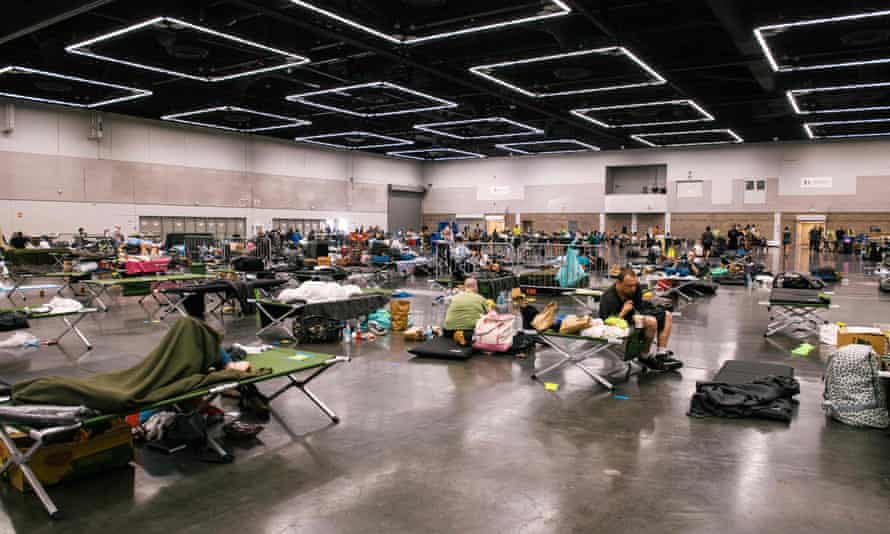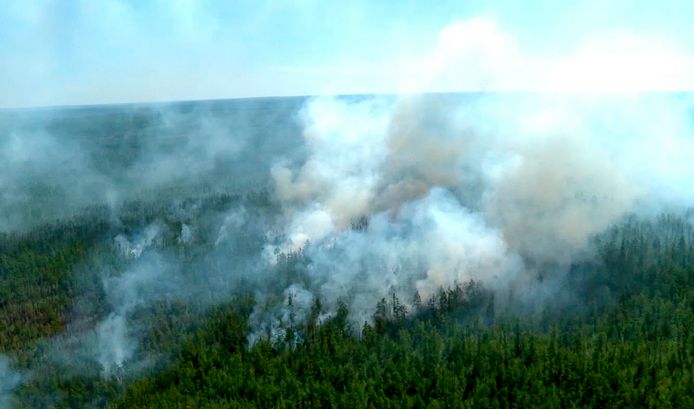Nowhere is safe, say scientists as extreme heat causes chaos in US and Canada
Governments urged to ramp up efforts to tackle climate emergency as temperature records smashed

Climate scientists have said nowhere is safe from the kind of extreme heat events that have hit the western US and Canada in recent days and urged governments to dramatically ramp up their efforts to tackle the escalating climate emergency.
The devastating “heat dome” has caused temperatures to rise to almost 50C in Canada and has been linked to hundreds of deaths, melted power lines, buckled roads and wildfires.
Experts say that as the climate crisis pushes global temperatures higher, all societies – from northern Siberia to Europe, Asia to Australia – must prepare for more extreme weather events.
Sir David King, the former UK chief scientific adviser, said: “Nowhere is safe … who would have predicted a temperature of 48/49C in British Columbia?”
King, who along with other leading scientists set up the Climate Crisis Advisory Group earlier this month, said scientists had been warning about extreme weather events for decades and now time was running out to take action.
“The risks have been understood and known for so long and we have not acted, now we have a very narrow timeline for us to manage the problem,” he said.
In Canada experts have been shocked by the rise in temperature, which on Tuesday hit 49.6C (121.1F) in the town of Lytton, British Columbia, smashing the national record for the third day in a row.
On the US west coast, Seattle and Portland have registered consecutive days of exceptional heat. Local authorities said they were investigating about a dozen deaths in Washington and Oregon that could be attributed to the scorching temperatures.
Michael E Mann, professor of atmospheric science at Pennsylvania State University and author of The New Climate War, said as the planet warmed up such dangerous weather events would become more common.
“We should take this very seriously … You warm up the planet, you’re going to see an increased incidence of heat extremes.”
Mann said the climate was being destabilised in part by the dramatic warming of the Arctic and said existing climate models were failing to capture the scale of what was happening.
“Climate models are actually underestimating the impact that climate change is having on events like the unprecedented heatwave we are witnessing out west right now,” he added.
On Wednesday the US president, Joe Biden, blamed the climate crisis for the heatwave in the western US and Canada which officials said had already broken 103 heat records across British Columbia, Alberta, Yukon and Northwest Territories.
The US National Weather Service said the peak in the region was 42.2 C on Tuesday in Spokane, Washington, another local record. About 9,300 homes lost power and the local utility Avista Utilities said planned blackouts would be needed, affecting more than 200,000 people.
In British Columbia (BC) at least 486 sudden deaths were reported over five days during the heatwave. The chief coroner said typically there would have been about 165 sudden deaths, suggesting more than 300 deaths could be attributed to the heat.
“While it is too early to say with certainty how many of these deaths are heat related, it is believed likely that the significant increase in deaths reported is attributable to the extreme weather BC has experienced and continues to impact many parts of our province,” Lisa Lapointe said in a statement.
Lapointe said the figures were preliminary and would increase as coroners in communities across the province entered other death reports into the agency’s system.
“Our thoughts are with people who have lost loved ones,” said Canada’s prime minister, Justin Trudeau, warning the blistering temperatures in a region of the country ill-prepared for such heat was a reminder of the need to address the climate crisis.
Police sergeant Steve Addison said: “I’ve been a police officer for 15 years and I’ve never experienced the volume of sudden deaths that have come in such a short period of time.”
Many of those who died over the five-day period were elderly people who lived alone and were found in residences that were hot and not well ventilated.
“People can be overcome by the effects of extreme heat quickly and may not be aware of the danger,” Lapointe said.
Scientists said that the scale of the heatwave in the US and Canada should serve as a “wake-up call” to policymakers, politicians and communities around the world, especially in the buildup to the crucial UN Cop26 climate summit to be hosted by the UK in November.
“The risk of heatwaves is increasing across the globe sufficiently rapidly that it is now bringing unprecedented weather and conditions to people and societies that have not seen it before,” said Prof Peter Stott from the Met Office. “Climate change is taking weather out of the envelope that societies have long experienced.”
Prof Simon Lewis of University College London described the situation as “scary” and warned that extreme heat events could have huge impacts on everything from food prices to power supplies.
“Everywhere is going to have to think about how to deal with these new conditions and the extremes that come along with the new climate that we are creating. That means everyone needs plans.”
“This is a warning in two senses,” said Lewis. “We have to get emissions down to zero fast to cut off the new extreme heatwaves, and we have to adapt to the new climate conditions we are creating.”
Bron: The Guardian - Thu 1 Jul 2021 16.35 BST
HLN: Redactie Bron: BELGA
Duizenden mensen in de weer tegen bosbranden in Rusland
In heel Rusland zijn duizenden mensen zware bos- en natuurbranden aan het bestrijden. Vooral de deelrepubliek Jakoetië in het Verre Oosten van het land is zwaar getroffen. Daar is sprake van 196 bosbranden, waarbij alles samen 288.460 hectare getroffen is, aldus de Russische autoriteiten. Het gaat om een gebied van zowat de grootte van de provincie Antwerpen. In de dunbevolkte regio geldt intussen de noodtoestand.
Milieuorganisatie Greenpeace stelt vrijwilligers ter beschikking in het gebied. Zij springen ook bij in het nationale park waar de beroemde Lenapilaren gelegen zijn. Die staan sinds 2012 op de Unesco-lijst van werelderfgoed. Het moeilijk bereikbare gebied is zwaar getroffen.
In heel Rusland woeden er 264 bosbranden, goed voor 325.526 hectare. Meer dan 4.700 mensen, honderden voertuigen en 25 vliegtuigen en helikopters zijn ingezet tegen de vlammenzee. Op verschillende plaatsen zijn de bluswerken stopgezet omdat er geen mensenlevens meer bedreigd zijn. De kost van het blussen is er groter dan de schade door het vuur, klinkt het.
De Russische staatstelevisie toonde ook beelden van grote bosbranden en de bluswerken. Jakoetsk, de hoofdstad van Jakoetië, is in rook gehuld. De autoriteiten zetten nabij de stad helikopters is om de vlammen te bedwingen, klinkt het in een mededeling.
Volgens experten van Greenpeace heeft de klimaatopwarming de situatie op scherp gesteld in Rusland. Jaar na jaar zijn er grote natuurbranden, die ook woeden in de Taiga. Die wouden zijn net belangrijk in de klimaatstrijd. In Jakoetië zijn de branden bovendien vroeger dan gewoonlijk uitgebroken, aldus Greenpeace, door de zware hitte en lange droogte. maar slechts een deel van de branden wordt veroorzaakt door blikseminslagen. De meeste branden zijn door de mens veroorzaakt, aldus de ngo.






